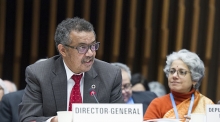142nd Session of WHO Executive Board endorses 13th General Programme of Work

Its members are elected for three-year terms and the EB is saddled with the tasks of giving effect to the decisions and policies of the World Health Assembly (WHA), advising it and generally facilitating its work. The WHA which is held annually in May includes all the member-states of the WHO. The EB formulates the Assembly’s agenda and draft resolutions for deliberation.
This will be the first statutory WHO EB meeting since Dr Tedros Adhanom Ghebreyesus became Director-General on 1 July 2017. In his opening dialogue with the EB, Dr Ghebreyesus noted that “this is a special year in many ways.” WHO will be commemorating its seventieth anniversary and it will also be forty years since the Declaration of Alma-Ata on Primary Health Care.
The Director-General then went on to focus on three key issues: Universal Health Coverage (UHC), Global Health Security (GHS), and transforming the WHO to be more effective in delivering on its mandate as the specialised agency of the United Nations charged with directing and coordinating international public health, towards building a better, healthier future for people all over the world.
Transformation of the WHO, strong leadership and resource mobilisation, he stressed are building blocks for the foundations of the future of WHO. The draft 13th General Programme of Work (GPW 13), which as the first item on the agenda was endorsed by the EB 142, is equally an element of this foundation, as well as a mechanism for cementing the different blocks together.
The World Health Organization’s General Programme of Work is the highest-level planning document of the WHO, providing a strategic vision of the work of WHO. It usually covers a six-year period, setting the principles and priorities of work for a set of three two-year (biennial) periods. The 12th GPW was for the 2014-2019 period.
The draft 13th GPW which is for a five-year period (2019-2023), marks the new WHO leadership’s vision to “promote health, keep the world safe, serve the vulnerable”, and its commitment to hit the ground running with organisational and strategic shifts that would enable it carry out its WHO transformation agenda.
PSI and its civil society allies attending the WHO EB 142 appreciate the forward looking character of the draft GPW and stands ready to work with WHO under its new leadership in a renewed effort to achieve Health for All. We however note a few important gaps. These include:
- silence on the WHO financial crisis and lack of direct reference to donors’ chokehold through tight earmarking of almost all donor funding. Virtually all WHO’s programmatic expenditure is funded through donor funds. Strategies which are endorsed by the World Health Assembly but which donors do not like, do not get implemented. There is a pressing need to highlight financing dialogue through which the Secretariat meets with WHO’s donors to try to persuade them to fund the various programs and initiatives endorsed by the Assembly, and even more importantly, for member states to recognise the importance of WHO’s work and the human cost of the continuing donor chokehold and to commit to a schedule of increasing assessed contributions by 5-10% in each of the next three biennia;
- while GPW 13 proposes several organisational and strategic shifts as part of the needed WHO reforms, there are no structural proposals offered to empower WHO Representatives (WRs) and WHO Regional Directors (RDs) to engage in robust and evaluative debate with member states in their regions, regarding global health policies and priorities, including in rich countries. This constrains their effectivity in providing leadership and coordination at the level of the WHO regional committees;
- further, PSI and its civil society allies urge caution in operationalising the concept of “multi-stakeholder partnerships”, particularly as regards private sector. This could unwittingly be a trojan horse, as demonstrated with the corporate capture of food and nutrition governance, which poses grave danger to the human right to health. While the framework for engagement with non-state actors (FENSA) provides principles and protocols for the management of potential conflicts of interest, including those associated with ‘multi-stakeholder partnerships’, it is focused solely on decisions taken within the Secretariat and does not address the accountability of member states. There is thus a pressing need for GPW 13 to underpin caution in promoting partnerships with private sector entities.
Apart from draft GPW 13 which it has endorsed, WHO EB 142 is deliberating on a number of: strategic priority matters; technical matters, and; other managerial, administrative and governance matters. These include: public health preparedness and response; polio transition planning; health environment and climate; early childhood development; the Global Vaccine Action Plan; maternal, infant and young child nutrition, and; engagement with non-state actors.

